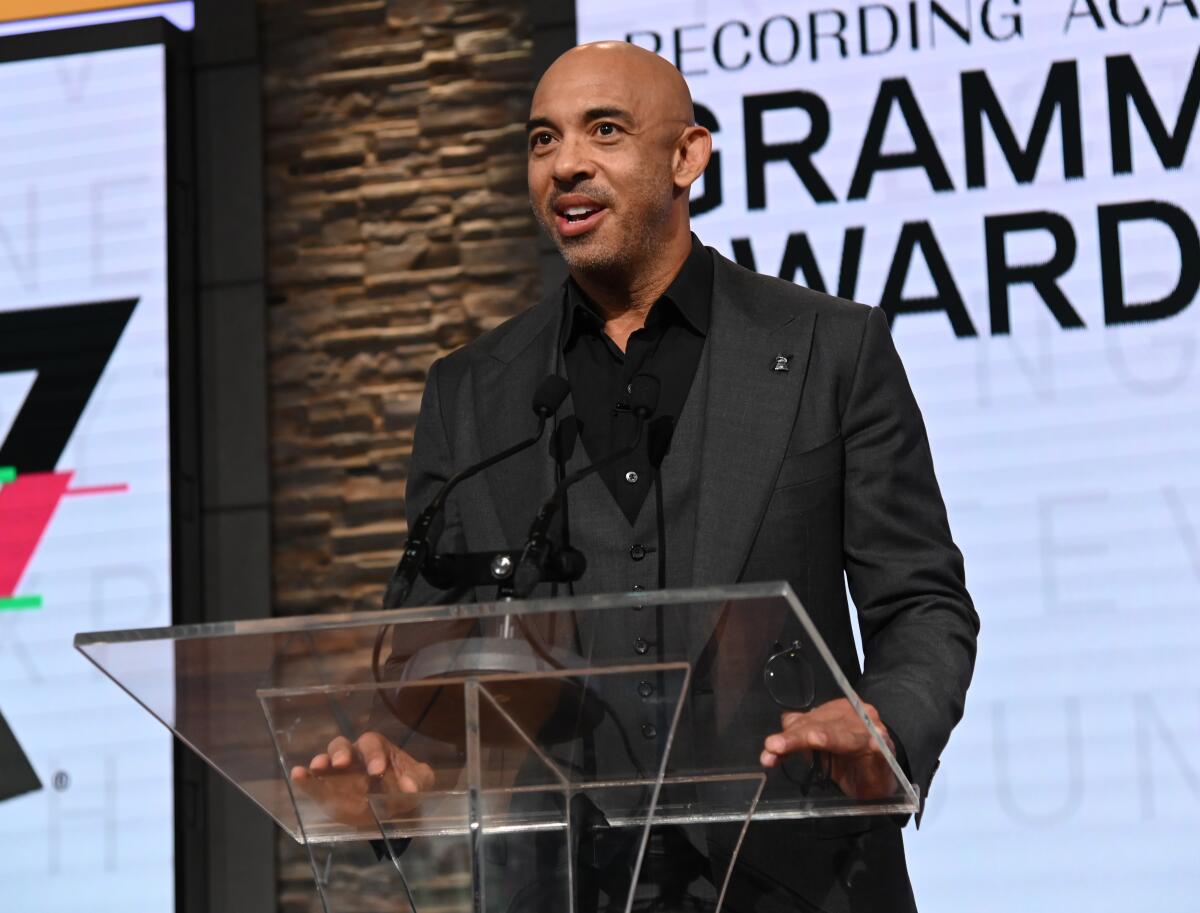Recording Academy proposes new diversity initiatives after outcry over Dugan allegations

- Share via
In the midst of a public showdown between the Recording Academy and its first female president and chief executive that has played out dramatically in the run-up to tonight’s 62nd Grammy Awards ceremony in Los Angeles, academy board chairman Harvey Mason Jr. issued a lengthy statement Sunday morning addressing some of the issues at the core of the dispute, along with a five-point pledge Mason said will help the organization better serve the music community.
Mason, who also is serving as the academy’s interim president and chief executive since the board placed Deborah Dugan on administrative leave on Jan. 16, outlined a series of changes he said the academy will implement to address shortcomings highlighted by the work of a diversity and inclusion task force appointed in 2018.
“The music we create has always reflected the best of ourselves and our world,” Mason’s statement read. “But what was true of music has historically not been true of the music business as a whole. Too often, our industry and Academy have alienated some of our own artists — in particular, through a lack of diversity that, in many cases, results in a culture that leans towards exclusion rather than inclusion.”
To address those matters, Mason said the academy will hire a dedicated diversity and inclusion officer within 90 days; establish a “fellowship,” funded by the academy, to monitor progress on inclusion and diversity within 120 days; create another fund, under the purview of the diversity and inclusion officer, that will make annual donations to women in music organizations; “recommit to meeting all 18 of the Task Force recommendations”; and reconvene the task force in 45 days to evaluate progress toward these goals.
The task force of 15 women and three men, led by former First Lady Michelle Obama’s former chief of staff Tina Tchen, recommended 18 changes to remedy various problems it discovered during more than a year examining issues of gender and racial bias in the music industry at large, and within the Recording Academy in particular. It found a systemic lack of diversity among the academy’s overall membership of 25,000 musicians, songwriters, producers, engineers, record company personnel, students and others.
The same was true, the task force asserted in its 47-page final report issued in December, of the approximately 13,000 voting members who determine the nominees and winners of the Grammy Awards annually, as well as of the academy’s 40-member board and the select nomination review committees assigned to curate many, but not all, of the 84 categories in which awards will be presented tonight.
Many of the areas the task force said needed to change were also cited in a harassment and retaliation complaint against the academy that Dugan filed recently with the federal Equal Employment Opportunity Commission. She was stripped of her executive authorities and placed on leave citing a complaint of workplace misconduct from a close associate of her immediate predecessor, Neil Portnow.
Dugan, who was sidelined less than six months after she started her new post on Aug. 1, raised concerns about voting irregularities, financial mismanagement, self-dealing and conflicts of interest among board members and some of those who sit on the powerful nomination review committees.
Mason’s statement did not refer to Dugan by name, but alluded to her.
“It’s been a challenging week for our Academy family,” Mason wrote. “I’ve heard from many of you who feel betrayed and hurt by the untruths being spread about our motives and actions, the integrity of our process and the artists who’ve rightfully earned their Grammy nominations, and the reminders of the hard truths we do have to face as a community.”
Dugan’s lawyer, Douglas Wigdor, promptly responded to Mason’s letter referring to it as “all smoke and mirrors” and calling for Mason’s removal as board chairman and his client’s reinstatement as president and CEO to oversee the changes his statement outlines.
Wigdor’s statement put forth four counter-proposals “to effectuate meaningful change at the academy.” They include the immediate suspension of the nomination review committees she alleged have been subject to manipulation by committee members. He also called for “a truly independent investigation into the Board’s relationships, self-dealings, and use of public non-profit monies.”
Wigdor criticized the academy’s decision to put Dugan on leave, saying it demonstrated a double standard.
“The prior male CEO was not even put on leave when he was alleged to have raped a woman,” Wigdor wrote. “Yet, Ms. Dugan remains on leave to this day.”
His four recommendations to the academy:
“First, there must be an independent and qualified professional Chair and Board. Second, the Academy must agree to immediately suspend the conflict-rife nominating review committees (“secret committees”). Third, there must be a truly independent investigation into the Board’s relationships, self-dealings, and use of public non-profit monies. Finally, the Board must immediately reinstate Ms. Dugan as the CEO of the Recording Academy to oversee and effectuate such changes.”
More to Read
The biggest entertainment stories
Get our big stories about Hollywood, film, television, music, arts, culture and more right in your inbox as soon as they publish.
You may occasionally receive promotional content from the Los Angeles Times.











